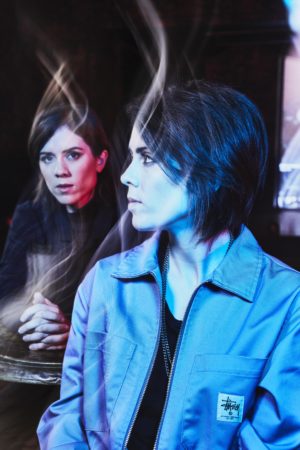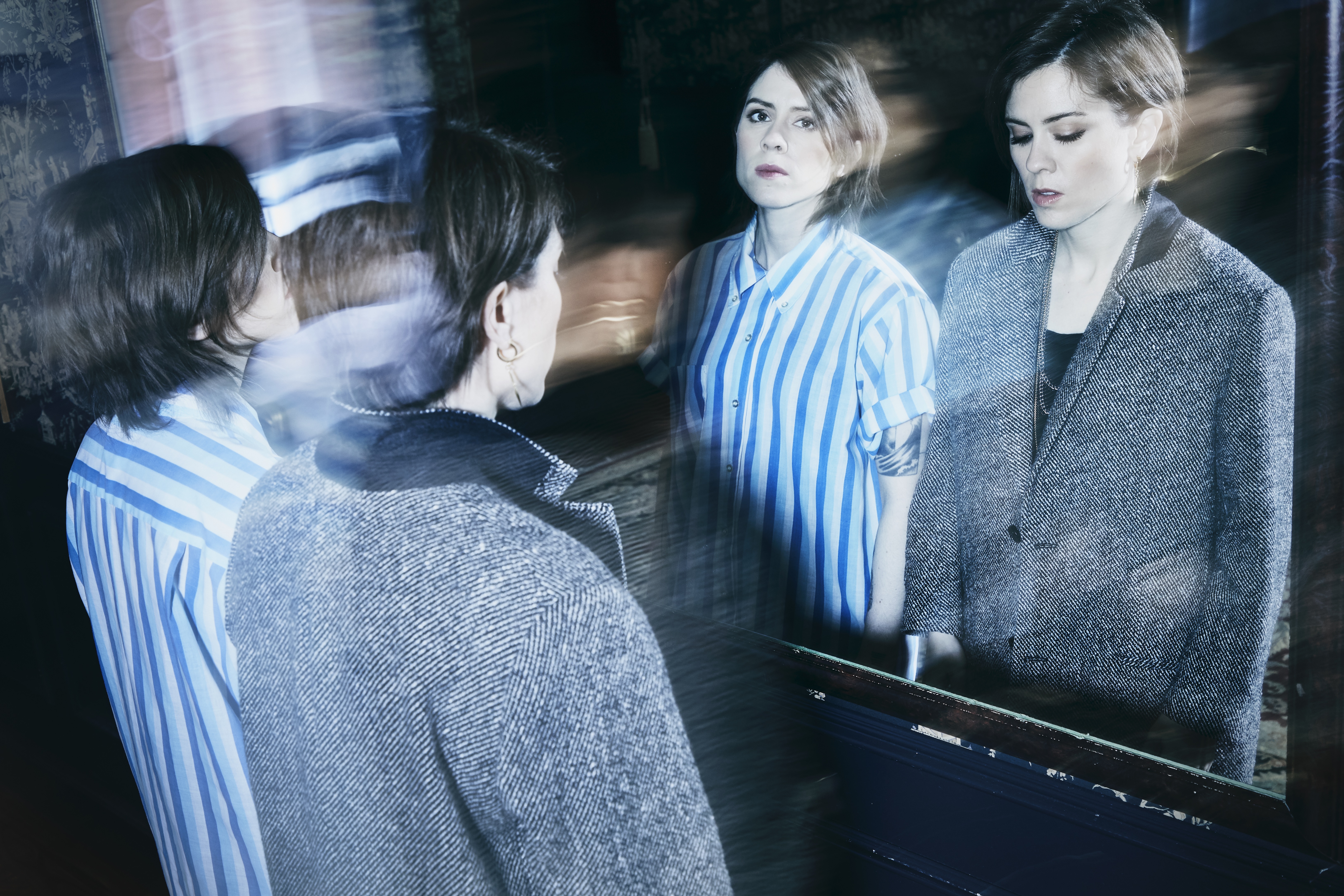One oppressively hot day in Manhattan in early August, I find Tegan and Sara Quin waiting for me in one of the multipurpose lounge areas of the Arlo SoHo Hotel.
With their last two records—2013’s Heartthrob and 2016’s Love You to Death – the identical twin sisters successfully transformed from cult indie artists to formidable mainstream pop stars. Over the last few years, however—not counting a tenth anniversary celebration of their breakthrough album The Con in 2017—the pair have remained relatively quiet. Until now, when they came to town to discuss the forthcoming release of not one, but two new creative undertakings.
The first is their co-authored book, High School, a memoir that, as the title suggests, delves into the sisters’ late adolescence, detailing their often-fraught relationship and the years that resulted in both their first output as songwriters and their first respective explorations into same-sex relationships. The second project is the duo’s ninth studio album Hey, I’m Just Like You. During the archaeological process of writing High School, the Quins rediscovered several long-lost tapes and early recordings, and impressed by the straightforward craftsmanship and lyrical honesty of what they had written all those years ago, were inspired to take the demos and filter their past work through their modern pop perspective, with twenty added years of experience.
“You’re actually the first press we’ve spoken to for the album,” Sara says as we sit down together. “You can claim that every pull quote you’re going to see in every other interview, you’re going to be like, ‘They really worked their material with me first.’”
Despite their very formal introductions and an identifying sense of style, I had a fear that I would somehow manage to mix them up during our conversation. When speaking with the pair, however, their personalities became perfectly discernible. Though born only a few minutes before Sara, Tegan gives off the air of an older sister. She is measured, self-assured. Sara, the younger, is unfiltered and assertive. She’s passionate to the point that when she cares about something, she’s all in—as evidenced by the fact that she tears up at one point, when discussing a particular memory.
“You go ahead,” says Tegan, looking at Sara, when I ask my first question. “No, you go, Tegan,” says Sara in reply. “Thank you,” Tegan concedes, then turns to me. “This is a new thing where we politely invite the other to speak.”
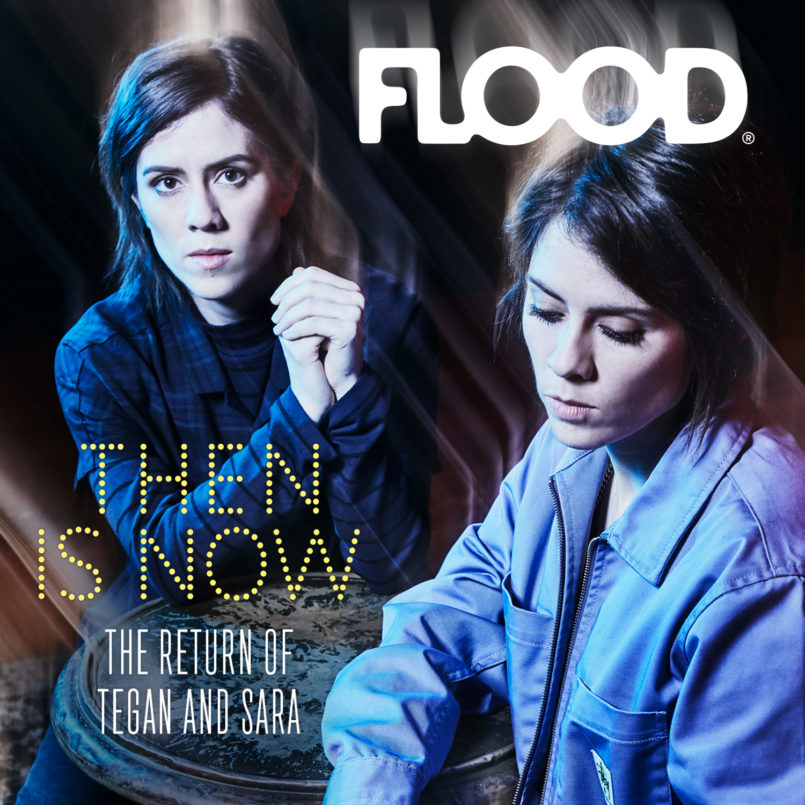
Cover design by Jérôme Curchod
What made the two of you want to start writing a memoir?
Tegan: Sara and I actually talked a lot about it over the years, how cool it would be to write a book—but I don’t think we knew what to write about. Everybody always gravitated toward, “Well why don’t you write about your career?” And we were like, “Why? Who would want to read about that?” I know people would, but we weren’t interested in writing it. And when we finished our last record cycle, we really wanted to work, but not necessarily jump into a record. And so we started brainstorming about the book. Within a few months, we had a few meetings and talks about it. And we came up with this idea that if we were truly going to write about our career, well, our career started in high school. So why not write about that?
Once we decided we were going to do it, our agent told us we had to do a proposal. And everyone sent me their mock proposals, which were like five pages. And our agent was like, “Yours will need to be a little longer. You’re not writers. You’ll need to really explain things to the prospective publishers.” And I was like, “No problem. That’s easy.” And Sara was like, “I’ll write a sample chapter,” and I was like, “And I’ll write the proposal.” Two months and eighty pages later, seven sample chapters, a whole marketing plan—we did it all. But I’m really glad we did. Because for us, it was important to formulate exactly what it was we were trying to do. And I think it was bigger than the book. We wanted to tell the story of the beginning of our career. But by that point, we had also found the music and knew we were going to make a record about it. And we wanted to go back to our roots, go out and tour and kind of strip back all the pop star, rock star bullshit and get back to who we are.
Sara: I would just like to say that “pop star, rock star bullshit” is also very fun. It is a choice. We’re not dissing it. We can’t wait to get back to that. That is a really fun persona, too. We’re always just ourselves, but it is sort of like, “OK, how are we going to dress up this album?” whether it’s the aesthetics or the live show or the marketing or whatever. But Tegan’s right. We’re almost like characters, and the outfits and the costumes and the sort of pomp of things—there is something about stripping it back that’s just exciting, to see what’s there.
There were so many circumstances in the book that felt relatable, particularly the awkward navigation of sexual attraction and developing feelings for another person combined with the dread of potential rejection.
Tegan: I think there’s a throwaway around adolescence, this idea that you grow up and you think to yourself, “Ugh, ridiculous young people, what do they know?” But those are the first times that we’re going through all those things. And I think Sara and I were really intrigued by the challenge of trying to go back to that time, and to write about it without patronizing ourselves, without stripping away how deeply important those times are and those feelings—all of us can relate to that. And I think the book is unique in that it’s about twins, and girls, and I agree with you that I think these are all incredibly universal topics. We’re trying to generate the first time that you felt that inside yourself.
Sara: And also, not to be sort of binary or reductive about it, but in the context of us being teenagers in the ’90s, there was this sense that when you hit puberty, it becomes like, “Which boy likes me? Which boy will ask me out? Which boy will I say ‘yes’ to?” And we were trying to figure out that context as closeted queer women. I think it makes our interior experience of that time really relatable to a lot of boys. Because I was having a lot of those, “Does she like me? I feel so scared. What if I say I like her, and she rejects me?” I actually think I didn’t necessarily relate to girls at that age, because most of my girlfriends were either disinterested in boys, or they were waiting and they were sort of participating in that tried and true, weird, sexist thing that happens, which is like, “Oh, Michael likes me. I can’t wait for Michael to ask me out.” I was sitting there going, “I want to ask Naomi, and I’m gay. This is so confusing.”
“I think we felt a desire to expose ourselves and say, we weren’t always like this. It was hard. We were kind of shits in a way. We were homophobic. We struggled. And it wasn’t easy.”
— Tegan
And so in a lot of ways, my relationships and friendships with boys was me sort of indiscreetly asking them questions about the girls they liked, because I think I was resonating deeply with their insecurities. And not that I don’t think women can relate to my version of the story that I tell in High School, but I’ve always felt—even with music—that in some ways, part of me was just longing to connect, feeling very isolated as a young person, like a shy, insecure guy who was desperate to find a girlfriend.
 How difficult was it for you writing these personal stories, knowing that a lot of people were going to read them?
How difficult was it for you writing these personal stories, knowing that a lot of people were going to read them?
Tegan: It was interesting, because after we finished our fourth draft of the book a month later, we went into pre-production on the record, and it was cool to be able to not have to guess at what the differences are, but to truly live them again. Like, “This is what it felt like to write a book and expose ourselves” and, “This is what it feels like to expose ourselves in music.” And they’re very different. I think in music, there’s a layer of protection because you have to be universal and you have to write in a certain way. Where with the book, yes, it’s really exposing. It’s very much a stripping away of those typical devices where you’re like, “Well, I can’t say her name here, because it doesn’t rhyme with this word.”
But it was good for us, honestly, to shake it up a little bit. I think this ties into the idea of us leaving behind where we’ve been for the last five or six years for a second. Because pop music is about being more universal and trying to reach everyone. And I think we were really excited at the idea of actually focusing and digging in and trying reach people specifically. So the exposure felt necessary, and it felt worth it. Every time I would cringe and be like, “Oh God, am I going to really tell this detail?” Or when I would get a chapter from Sara and I’d be like, “Eck, this is a real personal look at our lives,” I would then think, “That’s important.”
Sara said this a few weeks ago, but it’s like queer stories or female stories as adults always have to either be tragic, or it has to be like, “We made it! And we’re great now. We’re leaders and we’re icons, and we’re on a pedestal and we’re perfect. And you’ll make it too! And it gets better!” And I think Sara and I have felt a lot of pressure—and good pressure—but a lot of pressure to be role models and to tell our story and to show that you can be queer and outspoken and political and different. And we have survived all that and been very successful. But I think we felt a desire to expose ourselves and say, we weren’t always like this. It was hard. We were kind of shits in a way. We were homophobic. We struggled. And it wasn’t easy. So that made it better. Every time I would cringe, I would just think to myself, “It’s worth it. It’s worth it. It’s worth it.”
The book alternates your point of view with every chapter. When you first had the opportunity to read what each other wrote about a particular experience, was there anything you hadn’t known about one another?
Sara: I mean, the short answer is, yes, of course. It was amazing. Like any story that you’ve been retelling, I knew the details of most of what Tegan writes about in the book, but to have her interior experience fleshed out, she gave me insight that I didn’t have before. I think my biggest takeaway, specifically, was the through line of our sexuality, and sort of coming to terms with that—I clearly had been worried. I had been thinking about my body and my identity, my sexuality, sort of that whole umbrella of issues, since I was little. When I started to sit down to write and I had to look back into my childhood, I realized, “Geez, I’ve been thinking about this as long as I can remember.” And I didn’t know how to contextualize it. Even at five years old, I remember having weird feelings about girls, “weird” meaning I felt shy. I felt nervous. I felt excited. I felt different than I felt when I was around little boys. I remember feeling weird around my mom’s friends, feeling weird when I saw Geena Davis in A League of Their Own. But I just remember not knowing what it was.
And then to arrive at puberty in junior high, I started to go, “Oh god. OK, now the line seems very clear.” And so to be able to really think about that, and then to read Tegan’s chapters and discover that her interior was really different…or at least, what she decided to share in the book. And that for her it was such a surprise, when she had that moment with her best friend, Alex. For her to have the kind of lightbulb moment—a lot of people have that. I’ve heard many, many coming out moments and stories over my adulthood, and to find out, “Oh my god, that was Tegan? Tegan had a lightbulb moment?” That’s crazy.
For me, I went through the whole evolution of learning how to make electricity. It was extremely gradual. Which is probably why I also had so much more internalized homophobia than Tegan. And I don’t know if it comes across in the book as much as it really did in my real life, but I suffered. I still suffer in a lot of ways, because I was keeping the secret my whole life. And it ate away at me, at my self-esteem, at my confidence, my joy. In lots of ways I struggled because I was so afraid of being gay. And I was so afraid of how I felt about my body and how I felt about other girls. So yeah, when I sat down and read Tegan’s chapters, I remember going to my therapist, and being like, “There’s either something really wrong with me that I didn’t know that Tegan wasn’t having this experience, or Tegan is full-on lying. I have no idea which one it is.” I just could not believe how different our experiences were.
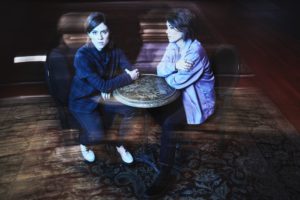 Tegan: I think for me, it was so insightful to read Sara’s side of the book because she had so much hesitation around her career and she does just have a kind of reluctance about things—whereas I’ve always been so gung-ho. It was cool to read her chapters about why that was, because I hadn’t put it together that her hesitation initially when we started to get attention was around her fear of how she was being revealed to people and being criticized. It never even occurred to me that we would be criticized or that people would care. In a weird way I joked when I went through my journals, I was like, “Was I dense?”
Tegan: I think for me, it was so insightful to read Sara’s side of the book because she had so much hesitation around her career and she does just have a kind of reluctance about things—whereas I’ve always been so gung-ho. It was cool to read her chapters about why that was, because I hadn’t put it together that her hesitation initially when we started to get attention was around her fear of how she was being revealed to people and being criticized. It never even occurred to me that we would be criticized or that people would care. In a weird way I joked when I went through my journals, I was like, “Was I dense?”
Sara: Oh, no, I really had that thought too, in therapy. I was like, “This whole time I thought Tegan was so smart and clever.” But then I’m like, “She might be an idiot.”
Tegan: It’s so odd. I just wasn’t worried. You know, I was worried about a lot of other things. I struggled with a lot of other things. But for some reason, not that.
“I remember lying in bed paralyzed for days after our first bad review. I felt sick, sicker than I’d ever felt in my life. And Tegan was like, ‘Who cares? Get over it.’” — Sara
Sara: I mean, she says it in the book, but I remember in high school getting those pieces of feedback that devastated me. Not just devastated me, immobilized me. I remember lying in bed paralyzed for days after our first bad review. I felt sick, sicker than I’d ever felt in my life. And Tegan was like, “Who cares? Get over it.” It was completely lopsided. And this is sort of an interesting twin experience thing, but in so many ways Tegan and I are very yin and yang and very balanced. This was one of those things where Tegan literally did not give a shit about what people said about us.
So much of the book is about exploring who you are and who you want to be, navigating a sense of individuality. How hard was it, as twins, to find your own identities?
Tegan: I think that’s something we still struggle with, to be honest. Sara and I both lived in LA for several years and we’ve now both relocated back to Vancouver, and I think even in our lives now we’re still trying to—politely, respectfully—carve out independent space, time, and friends, to keep our identities separate. We lived across the country from one another for the majority of our adult life, and I think in part it was because of preference, but also in part because you spend so much time together and there’s a grouping. I wrote a big essay at the beginning of this record cycle to our whole team where I was like, “Try to keep in mind that we are two individuals who are coming up on almost forty years old.” They’re always referring to us as “the girls,” “them,” “the band,” “Tegan and Sara,” so just remember it’s nice to have you send us individual emails, to ask each of us an opinion, or reach out to me without Sara on copy. We’re still struggling to carve out that space.
I think in the creative world, we really support one another. I don’t need my name at the bottom of whatever song I wrote. I am glad to have it be “Tegan and Sara.” It’s not as important for me to carve out, “This is mine!” I don’t need to put a stake in it. But I think in the business side and the personal side, there is still a desire to say, “I am very different than her and I have very different needs than her and I don’t think I should have to share or compromise all the time.” And I think that’s why the book is really cool: because it’s the first time we’re standing alone. You can see my words. That’s my story. Those are my thoughts. And we can be compared for the first time. And that’ll be interesting to see, if someone will just come right out and be like, “I much preferred Sara’s side of the book.” There’s room for that now. And that’s exciting to us. I’m glad it’s coming out with the record, because there are songs on the record that Sara sings that I wrote. We’ve never done that before.
Throughout the book, I was also struck by how much you guys fought.
Tegan: And that’s, again, a watered-down version. Within the first six months of starting the process of writing, we established the themes, figured out how to write, scrapped things, went back and realized, “Oh we need a beginning, middle, and end” and, “Oh, we should probably coordinate,” and not just write randomly. We’re not writing essays. We’re writing a chronological memoir. There was a lot of trial and error. And I think that fighting became a very significant thing to the story, but it was like, how do we write a book? I mean, every single story could have been about fighting, because we fought constantly. So it was like, where are these key moments? And how do we use devices like drugs and music to show that these were small squares of common ground that we found with one another?
Sometimes I find being with Sara feels like being known, but also being alone all the time. It’s an odd thing where I just kind of feel like I know her and I think she feels like she knows me. And then sometimes there’s just silence that takes up that space and it can be incredibly lonely. I think there’s a lot of misconceptions about being twins, being sisters, being girls, being best friends, all these weird things. All this time, people have been imagining a very different kind of relationship between us. And we started to talk a little more about the disagreements or the struggles we’ve had in our career and as adults on our last record cycle, because some of Love You to Death is about that. But it was brutal when we were teenagers because we were alone. We were policing ourselves. We had to figure all that out without any tiebreaker.
Sara: We were still brutally fighting with each other in ways that to me seem so unacceptable now. But we had sort of created a really toxic relationship with toxic communication when we were under stress and dealing with conflict.
Tegan: I think that’s also why a lot of times in the book, the violence comes up when we’re upset, but then it’s about music because we needed each other. We needed each other at the beginning of the book too, when we’re doing drugs, because we needed someone to supervise the other one. And again, these become important devices of the book because that’s when Sara and I got along. And I think that music became this thing where what Sara was doing musically amazed me. And I wanted to be a part of it. And then when she would contribute to what I was doing, it complemented what I was doing so well, and I could see that it got this attention and this reaction from people, and it calmed us. It calmed us because we had something collectively to work on together.
Sara: And it discharged all that anger. We might be in the middle of fighting and then play a couple songs, and it was almost like it was this expulsion of energy from beating each other up, except that it was positive. Instead of fighting and wrestling, we were like screaming and singing and playing music.
 Tell me about the process of writing the book. How much discussion took place between the two of you? How much was just sort trading chapters back and forth?
Tell me about the process of writing the book. How much discussion took place between the two of you? How much was just sort trading chapters back and forth?
Sara: Similar to with our albums, we essentially just kind of went off to our own worlds. It was like Tegan wrote her book, I wrote my book, just like she writes her songs, and I write my songs. I knew what my full book structure was. I knew what I was going to write about in grade ten, grade eleven, grade twelve. And I actually just started to write as if Tegan didn’t exist. I mean, she exists as a character in my book, just like I exist as a character in her book. But I didn’t read her stories. I didn’t look at her book, until we were putting together the first draft. And then when we started to put together the first draft, it was like, “Oh, this is awesome,” because my chapter twelve rolls into Tegan’s chapter thirteen. And it would almost feel like the flow of a song, like it was in the same key, because she’s touching on the same topics, she was talking about this particular person and I was talking about that person, too.
Speaking of the music, when did you first find the demos?
Tegan: We found the bulk of the songs while we were still writing the proposal for the book, and at that stage, we barely listened to them. We’d done two trips back to Calgary to look through stuff and did a trip to our big storage unit that we have up in Vancouver. In high school, there were three tapes that we made. I digitized everything, sent it to Sara. Sara then messaged me and was like, “These songs are really good.” And I was like, “Right, I remember them being good.” And then I started listening to them and was like, “Oh, my God, these are great!” And I played them for my girlfriend, and I played them for a couple friends, just little pieces.
Of the twelve songs, I’d say probably six or seven are in their original forms. I went back and listened to the demos the other night to see how far away we got and it’s still there. We were writing very basic songs. But also, I’ve been listening to a lot of the music we were listening to in the ’90s lately, specifically Nirvana. And it’s like every chorus is just the same line repeated over and over again in a lot of their big songs, and it really imprinted on us, I think. That’s why on “Hold My Breath” and “I Don’t Owe You Anything,” we were really ripping off a lot of the bands we were listening to.
“We might be in the middle of fighting and then play a couple songs, and it was almost like it was this expulsion of energy from beating each other up, except that it was positive.” — Sara
Sara: I’ll be honest, the thing that really struck me about the music was that I hadn’t wanted to listen to it. I had sort of bought into the ideas that I remember attaching myself to when we were teenagers. I remember the first big pieces that journalists wrote about us in high school, describing our guitar playing as rudimentary, our songwriting as simple. And I decided that meant that we weren’t very good, and that there must be some other reason why people were interested in us. So I thought, “OK, what could those other reasons be?” Well, sometimes in those same articles, it would describe us as cute or something. There was obviously this underlying thing of, “Well, the record labels are going to just freak out over this band because here are these malleable, cute twins. Their guitar playing stinks and their songs are pretty simple. But the labels will figure the substance out later.” That was the version I took from that time. And what I realized when I was writing the book was that I had taken those ideas and I had made them my ideas. I would tell people, “Our old songs were simple. We weren’t very good. Ugh, you don’t want to listen to those songs. It’ll be nonsense.”
And I remember I didn’t want to listen to the old demos Tegan sent me. I avoided them for months. And I was in a cab going back to my house after a day of writing and I was like, “Well, I finally arrived at the time where I should listen to these songs because I’d like to include some lyrics and some descriptions in the book.” And I started—and this is not to be hokey—but I started crying in the car. I could cry now [Sara begins tearing up]. I was like, “These are not simple songs. Fuck these motherfuckers.” It allowed me to get to the surface of it. I was like, “Fuck these people. These are sophisticated songs. I’m seventeen years old, and I’m writing these songs.” And I’m listening to them and I desperately, desperately, in that moment, wanted to prove something that I had been afraid to try to prove my whole life, which was, if I heard a seventeen-year-old write “Hello, I’m Right Here,” I would be like, “That’s a fucking great song. Good for you.” I had bought into this idea that we weren’t as good as I think we were. And in the cab, for me, that was the moment that changed.
The album is a time capsule. When you were listening to these demos, what were you hearing from those younger versions of yourself—not in terms of the literal lyrics, but the points of view of these girls and their outlooks on life?
Tegan: When I write now, I often do so in the context of, “OK, I went through a breakup, or I had an emotional thing with a relationship, and here’s me filtering that experience, from my perspective, about the relationship.” In a way, it’s a conversation between me and that person for the benefit of the audience listening. And I feel like these old songs were—for me, anyway—conversations for me, between me and myself. It feels like advice to myself. I don’t believe that I was writing for an intended audience the way I would as a professional. I wrote in our press bio that I feel like these are songs we could not write now, because I cannot stop thinking—ever—about what Sara will think, what you will think, what the fans will think, how it will be compared to our catalog. So these songs are truly a prequel to us in a sense, because it was before we had an audience. It’s before people were paying attention. It’s before criticism. I’m just writing to me.
And so when I listen to the songs, they sound…pep talks is too simplistic a way to put it, but they sound like reassurance. They sound like self-talk. They sound like the moment before you walk in, and you’re about to face that person or that thing and your inside voice is being like, “You can do this. You can get through this.” It feels really powerful. It taps back into that moment in my bedroom where I would write the songs just for me. People are always like, “I went through a bad breakup and this song really helps me because I imagine that breakup,” but I hope this is a more intimate record than we’ve ever made because it was about me inside, a reflection on myself and my world and how I fit into it.
Sara: I totally agree with a lot of what Tegan is saying. One of the things that was really unique, and probably why I feel so emotional when I think about that day that I listened to those demos after so long, was that I don’t think I’d ever been able to listen to us before. I don’t know how to say it without sounding like a bunch of meta garbage here, but I was me, so I was listening to our songs as me and just thinking, “This sounds pretty cool. Awesome. Whatever.” But for the first time, listening to that version of myself, I could really hear her. I heard little me singing about things like, “What is my future going to be like?” And I’m an adult now. I’m an adult who is living the life that I couldn’t imagine for myself and I’m listening back to that insecure, nervous little Sara.
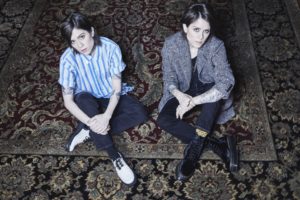 Tegan: And again, here’s what’s wild: we could never write those songs now. But every single question we’re asking of ourselves, every single fear, every single insecurity, still exists. They’ll always exist. That’s why you read the book and you relate. You tap into then. But then is now. We might get better and stronger and more solid and develop more ideas—but our core identity is defined at a certain age, right? And so when I listen to the songs, I can hear those questions I’m asking and feel emotional about it. But I still have all those questions.
Tegan: And again, here’s what’s wild: we could never write those songs now. But every single question we’re asking of ourselves, every single fear, every single insecurity, still exists. They’ll always exist. That’s why you read the book and you relate. You tap into then. But then is now. We might get better and stronger and more solid and develop more ideas—but our core identity is defined at a certain age, right? And so when I listen to the songs, I can hear those questions I’m asking and feel emotional about it. But I still have all those questions.
Sara: But when I wrote “Hello, I’m Right Here,” I’m seventeen years old and writing it in the months before I’m graduating high school, I’m still not out, I’m going to college, my mom is furious with me, I’m at blows with Tegan, we’ve won this contest, but I’m not even entirely sure I will even want to be a musician, I hate adults, I hate criticism, I hate all these things. And I listened to that line, “I wish I was older,” and I just started crying in the car hearing it [as an adult], because I know when I said “I wish I was older,” I’m basically saying, “I wish I had more experience. I wish I knew what was going to come next.” And now I’m thirty-eight years old.
Tegan: Jesus. I think we need to bring in a therapist to talk to Sara between interviews.
Sara: It’s because of therapy that I can access this fear. But it’s like, I listen to those lyrics now and I still feel that way. At thirty-eight years old, I still wish I knew how to get through all these things. It’s so hard. Life can be so hard. It’s very challenging to deal with life. I listened to myself at seventeen and I’m just like, “Little Sara was so wise.” Don’t we all wish we were a little bit older and knew how to get through this shit?
Music has this profound ability to tap into memories. When I hear a specific song, I’m transported back to where I was when I first heard it, emotionally. When you listen to these songs that were originally written in the past, are you reverting back to your former selves, or do you now associate them more with present day memories?
“I didn’t really want to be in a band and play music anymore. And not, like, quit Tegan and Sara, but, you know how you wear those in-ear packs onstage—this is when I get emotional—I just turned them off the last couple years and watched the audience in silence. I was bored.”
— Tegan
Sara: I don’t know yet. I always feel a little bit sad after we’re done a record. I can’t exactly explain it. I’m really proud of the album, I love it, but I don’t quite feel like I can hear it. I can only hear it as a professional. I clearly haven’t done enough therapy. My first thought when you asked your question was that I hear that I was having hay fever and then I needed to use my inhaler more. I hear my asthma.
Tegan: I feel like I’m a “past” addict. I love thinking about the past. And when I’m playing a song, I definitely don’t think about that time. When I’m back home rehearsing and listen to the songs now, I don’t think about the past. But I feel all the feelings that I felt then. Like you say, music brings up feelings. And for me, it’s been a gift, because I didn’t really want to be in a band and play music anymore. And not, like, quit Tegan and Sara, but, you know how you wear those in-ear packs onstage—this is when I get emotional—I just turned them off the last couple years and watched the audience in silence. I was bored. And not because of anything that anyone was doing wrong. But you get good at something and then you just keep doing it.
And then we went out and toured The Con X, which was for The Con’s tenth anniversary, and it was the happiest month I can remember in the longest time playing music. I felt in control on stage. I thought it was fun when we made mistakes. I could feel the audience on the edge of their seats. We talked to each other. And I was reminded of why we do all of this. And then I was so scared we would just make another record and I would just be turning the volume down again. And when I start rehearsing these songs, when I listened to the record when we were in the studio, I feel like how I did in the beginning: uncomfortable, worried, anxious, excited, like it’s an unknown. I have no idea how people will react to this record, but there’s part of me that’s like I was when we were seventeen and I was convincing Sara we had a career. I kind of believe this will be their favorite record of ours, because I think it’s maybe the best one we’ve written. It was just raw, and us, and we took twenty years of experience to make it good. And I feel like it gives me back all that joy and all of that power. We had to have so much power to even get through twenty years, and I feel like it just talked me up. It regenerated all that energy in me. That’s what I hear. FL
